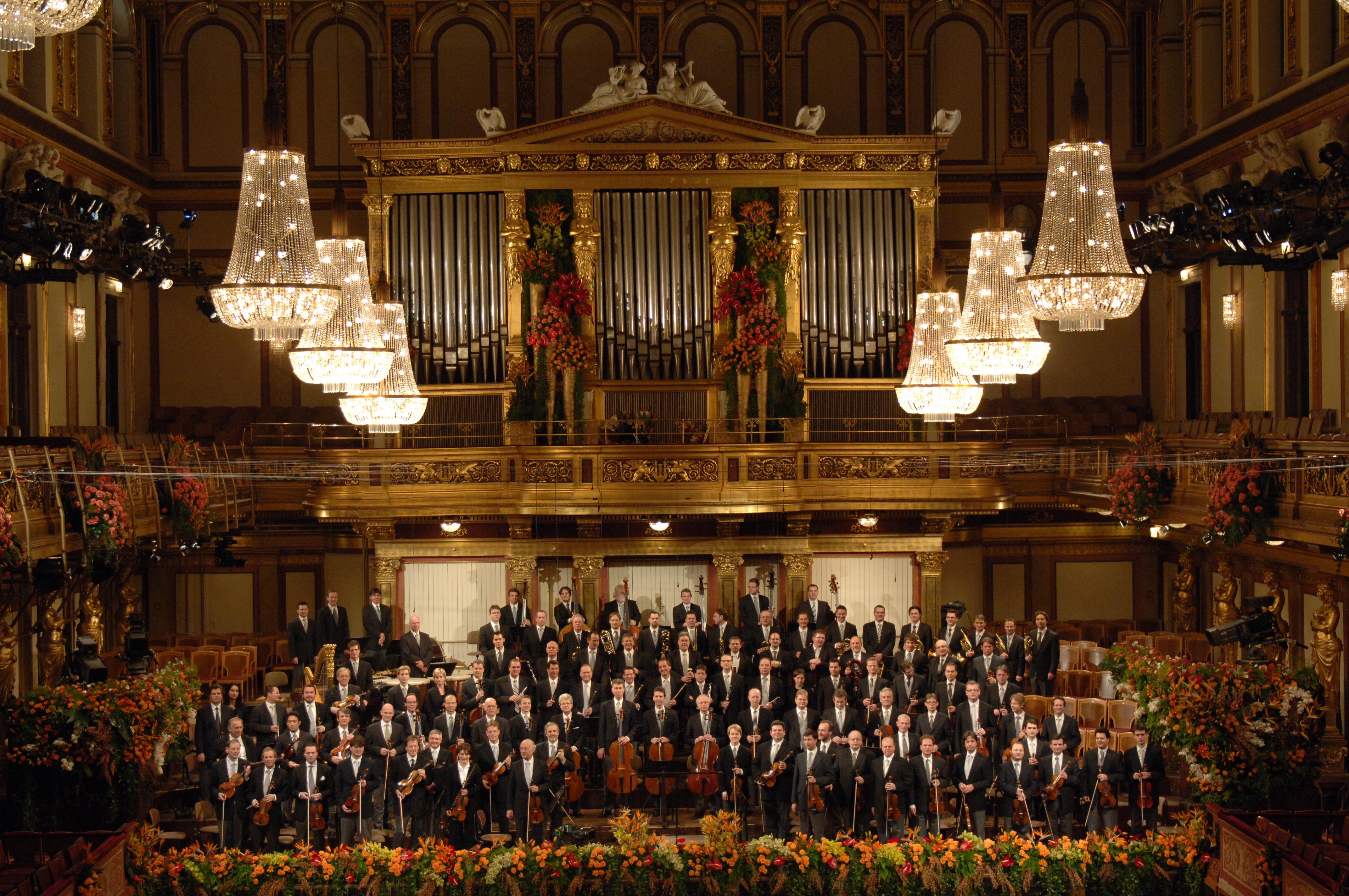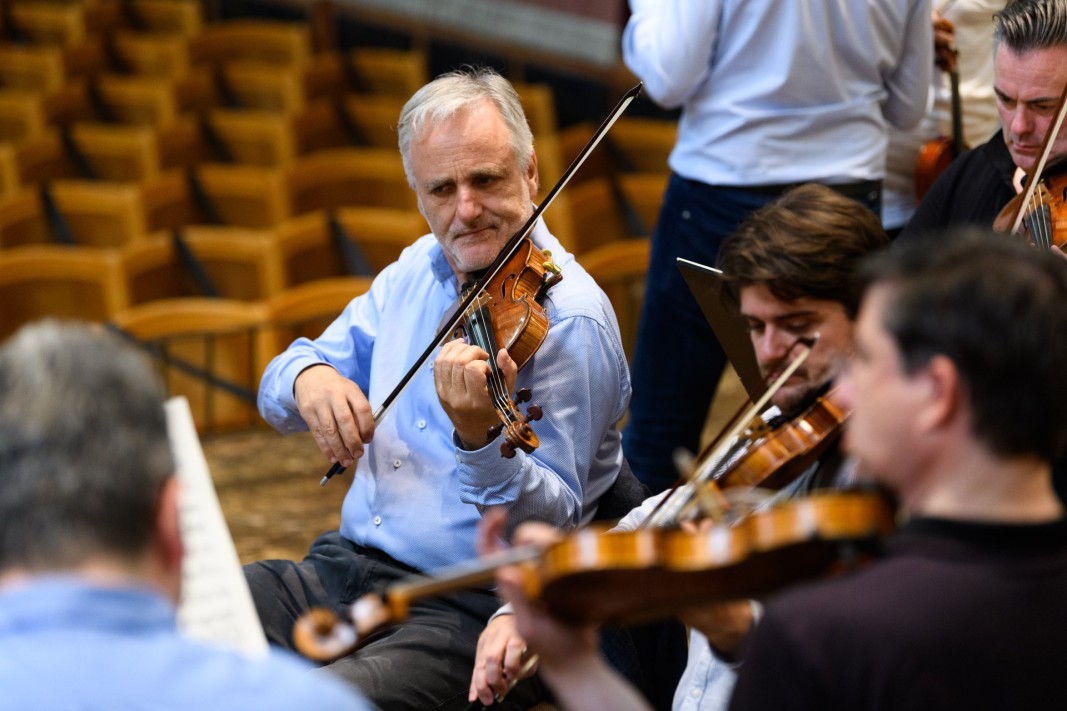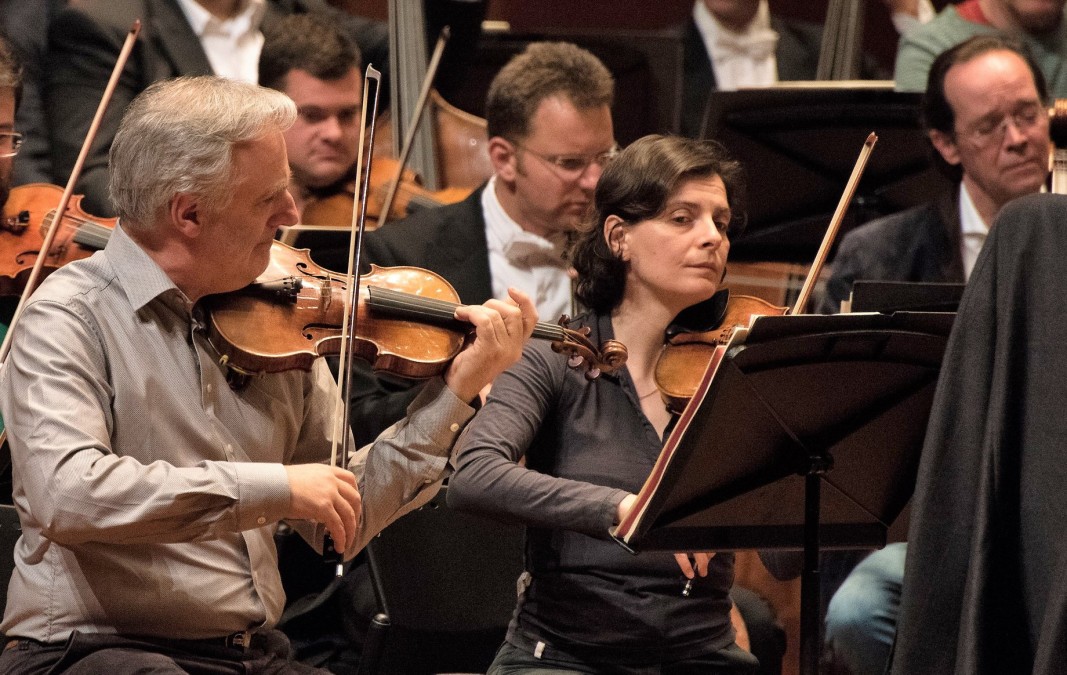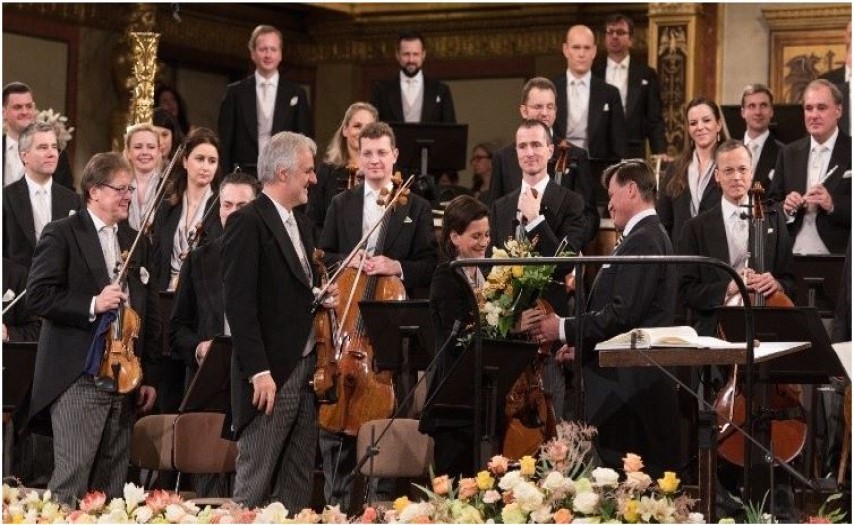The scent of cinnamon, cookies and pine, the satisfaction of looking at the crisp tablecloth and shiny cutlery, the cosy feeling of a bright new beginning on January 1st - what would all this be without the Vienna Philharmonic's New Year's Concert? Fresh from the iconic Musikverein, Radio Bulgaria's guest is Rainer Honeck, concertmaster of the famous Vienna Philharmonic Orchestra (VPO).
The outstanding Austrian violinist was in Sofia last week for a concert with world-famous pianist Plamena Mangova, the Sofia Soloists Chamber Orchestra and its conductor Konstantin Dobroykov. "I like the spirit of the orchestra - they are very disciplined, they know what to do, they have been playing together for a long time. I can feel that," said Rainer Honeck, adding that he felt very confident playing with them.

It was his first concert both with this orchestra and with Plamena Mangova, of whom he said he was "impressed by her incredible energy, emotional playing and virtuosity". But it wasn't the first time he had given a concert in Sofia. He recalled a bleak and somewhat depressing visit in the past:
"Actually, 42 years ago I was in Sofia playing with Karajan and the orchestra. It was 1983-82 and I was very young. Of course I have memories! It was very dark, very grey, I didn't have such a nice feeling because it was during the communist era. But now everything is bright, clean and nice. I hope it will not be another 42 years before I play here again."
Mr Honeck was 20 when he joined the Vienna State Opera and the Vienna Philharmonic as a first violinist in 1981, rising to the position of concertmaster at the Opera at the age of 23, and concertmaster of the Vienna Philharmonic in 1992 at the age of 31.
"I started with Karajan - in his last ten years. I had the opportunity to play with him and to experience his teaching. And now, when I think back, I think that this is the essence of how to produce a beautiful 'singing' sound."

Of course, when we talk to the concertmaster of the Vienna Philharmonic, we ask him what is the secret of the proverbial "Viennese" sound that makes the VPO's playing so recognisable?
"Many people ask me how to produce the Viennese sound. I think it is a mixture of beauty - beauty is the most important thing - but also emotional playing. It always comes from deep inside. Even when you play really softly, like pianissimo, it has to have all this tension and emotion.
We are also blessed in Vienna with this beautiful hall - the Musikverein. The sound of the hall is always in our ears. And then, of course, we are a good orchestra and we play with the best conductors. It has always been that way - for more than 180 years - always the best conductors. That creates a tradition. And this tradition is passed on from the older musicians to the younger ones.

"We also play in the opera. In fact, we spend more than half our time in the opera. And we play with great singers. As an orchestra musician, if you always play with great singers, you adapt, you breathe, you imagine how you would sing a melody on the instrument.
So I think it is the many small details that create the Viennese sound."
Music runs in the Honeck family. One of his nephews is also a violinist with the VPO, and his brother Manfred Honeck is a renowned conductor. It all started not so long ago. With his father, in fact.
"The most important person was my father. I come from a very large family - I am one of 9 brothers and sisters. We were born in the countryside, in the eastern part of Austria, very far from any classical music. But my father was a fanatical amateur musician, he played the zither, and his dream was for the whole family to learn an instrument. So after my mother died - I was only 4 at the time - he took the whole family to Vienna. To study. We had no money. We got help from some institution and so we were all able to learn an instrument.

Do you believe that now?
"Yes, but you have to look at it in a good way - don't destroy yourself, don't think you'll never be good enough. Optimistic without being unrealistic, that's the key."
It is no secret that Bulgarian violinist Albena Danailova, the first female concertmaster in the history of the Vienna Philharmonic, is not only Rainer Honech's colleague but also his partner. How has this relationship affected his perception of Bulgaria and the Bulgarian people?
"Of course it has changed dramatically. I didn't know much about Bulgaria before," he says, adding:
"I think Bulgarian musicians are very well trained. That's something I didn't know before. I am always impressed by how well these people play. When Albena came to Vienna and played in the orchestra, she also had to adapt to the Viennese style of playing, which she did very quickly, and I can say not only from a personal point of view, but also from an artistic perspective, that she is really a very valuable member of the orchestra.”

"As I said, I remember a lot of things from my first 10 years, when Karajan, Böhm and Abado and Bernstein and Kleiber and all of them - we had one of them every week - and it was really very intense.
I liked Mariss Jansons a lot. I liked his musicianship, his professionalism, the fact that he was always looking for beauty and yet he was technically perfect. But there are a lot of conductors who are fantastic, I can't really say I don't like this one or I like that one more. Because sometimes conductors have some repertoire that they do very, very well and other repertoire that they do not do as well as others. Everyone has their own approach to different music. Even Karajan, when he conducted Mozart and Haydn - it was also very beautiful, but maybe it could be more lively."
The Vienna Philharmonic's New Year's Concert on 1 January is heard in almost every home. How long does the VPO prepare for this event?

"We have three days of rehearsals, mornings and afternoons, so that's a lot, and then we have two concerts in advance - those are also sold, and the third concert is the New Year's Concert, which is televised live."
Is it stressful when you know that the whole world is watching?
"Yes, it is. Even though the music seems very light, happy and positive, at the same time you have to be careful that you don't make a mistake, that you do it really well. It's a bit tempting to say, "Oh, it's OK, nice melodies..." The Strauss music has to be played very, very well. If it's not played in the right tempo, with the right articulation, or in the right spirit, Strauss music can be a bit boring. Right away! But if you play it with the right spirit, with the right intensity, then suddenly it flies off! The margin is very narrow."
The conductor for the concert on 1 January 2025 will be Riccardo Mutti. But we won't see Rainer Honeck next to Maestro Mutti because, as he explained, "we rotate, I played in the last one, so you'll see me again in 2026".
Bayse Kasimlarli is a primary school teacher. She is one of those pedagogues for whom working with children is not just a profession, but a calling. She says that the little ones give her strength and energy, and she puts her whole soul and heart into..
American Rory Miller has been living in Bulgaria for over 15 years. Initially, he was involved in craft beer production. A few years ago, Rory participated in a popular cooking reality show. He has been mastering the subtleties of traditional..
Her heart was moved by the plight of little souls who had been wronged by fate, and this motivated her to undertake a journey to the other side of the globe. Dr. Elena Shtarbanova, a specialist in anesthesiology at the "Sveta Ekaterina" Hospital in Sofia,..
Bayse Kasimlarli is a primary school teacher. She is one of those pedagogues for whom working with children is not just a profession, but a calling. She..

+359 2 9336 661
